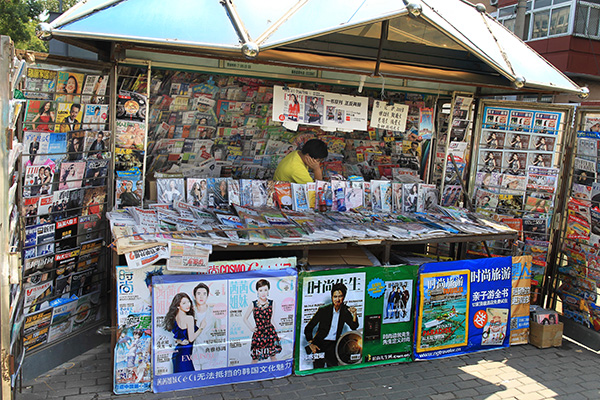 |
|
A newsstand in Chaoyang district, Beijing. [Photo provided to China Daily] |
The vendors, Lao Wang and his wife, seemed to have been doing a brisk business as they stocked a full range of print. On the sidelines, they sold a wide range of products from phone cards to drinks to lottery tickets. They open at about 6 am and close after 10 pm, except in the winter.
So I was taken aback a couple of months ago when I saw a notice on the side of his booth that it was for "the changing of hands". The newsstands are usually reserved for the city's jobless residents who often lease them to people like Lao Wang from other areas. Unless a tenant can find someone to take over, he stands to lose tens of thousands of yuan in the stock and "transfer fee" to the original owner.
While shaking his head, Lao Wang told me a dismal picture for his business, or business at most of some 2,000 newsstands across the city: Sales of once popular tabloid newspapers have kept dwindling to dozens a day; glossy magazines with higher margins are also increasingly difficult to sell. With income from non-news items, the couple makes 2,000 yuan to 3,000 yuan ($314 to $471) a month, roughly the same pay of a store cashier who works eight hours a day.
According to him, many of his colleagues are thinking about quitting the business. Some have stopped selling print completely and converted their kiosks into mini convenience stores.
I knew print had gone downhill as Chinese reading habits have changed. In 2014, tabloids, together with business and IT newspapers, declined for the third year in a row, by more than 30 percent. I felt lucky as the State media maintained a stable circulation thanks to a regular, sizable reader base.
But Lao Wang's story is still distressing as I imagine that prompted by further falls of tabloids, newsstands gracing our streets will close one by one, and newspapers will gradually become the fare for officials or older people only.
Sometimes I think about why I am a faithful reader of digest papers. They sift through a myriad of homogeneous reports seen in newspapers across the country and present only the best of others' work. The carefully selected and edited stories save time and costs for busy readers wanting to keep up with current affairs.
However, the digest papers also need to worry about their future as digital news providers improve their journalistic skills. Instead of discriminately pumping headlines into people's smart-phones, news portal editors are developing a flair for finding human-interest stories and focusing on red-hot social issues.
As an old-timer who grew up with print and now makes a living from it, I love newspapers. But I have found that more often than not, scrolling down pages of headlines on a tablet generates more interesting reads than leafing through a tabloid or two, or even more.
